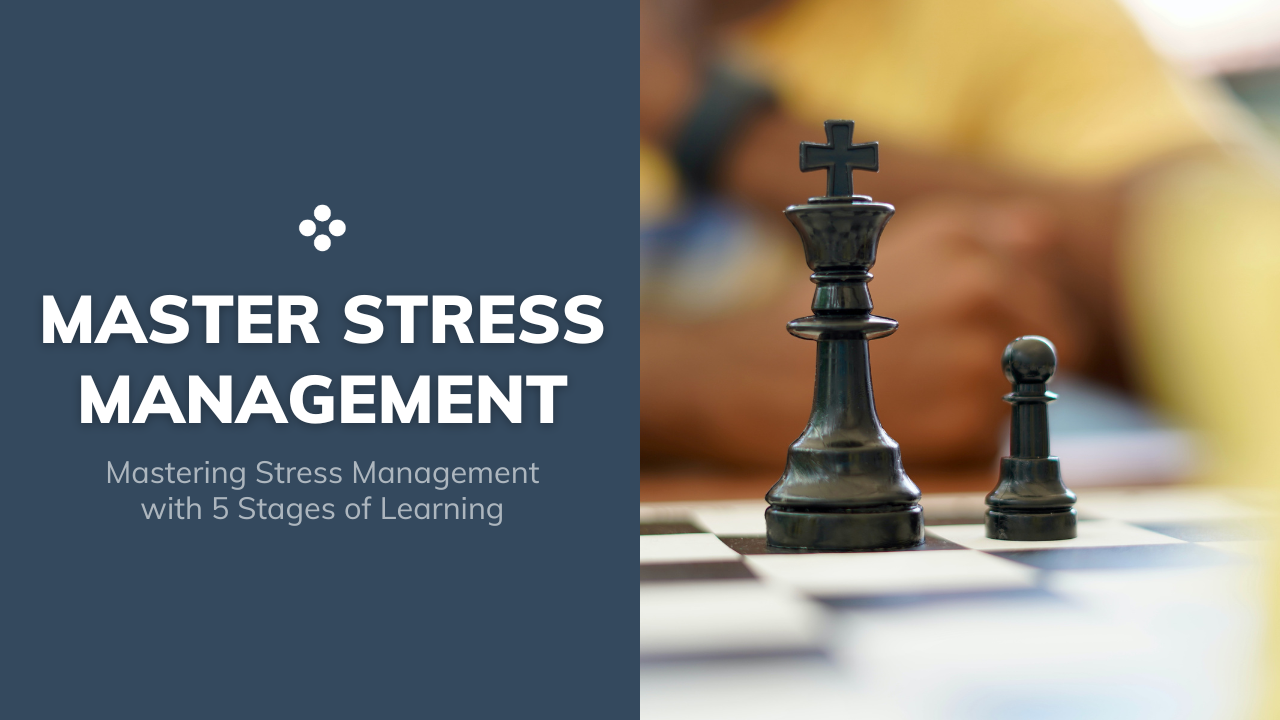Start Harnessing the Stages of Learning to Confidently Master Stress

From the moment you wake up, until you lay your head at night, you’re guaranteed to experience stress at some level. Though stress can be a helpful vehicle to drive progress, it can also be detrimental to your health.
Whether it's a personal challenge, work related pressure, or simply the demands of typical everyday life responsibilities like parenting, stress is an unavoidable part of your life.
And what’s also true is that without managing it well, stress has the capacity to take a serious toll on your mental and physical wellbeing. Stress left unmanaged can ruin your relationships and become an obstacle to you accomplishing your goals with any success.
However, it’s not all bad. Because when managed well, stress can be used to your advantage. For example, stress can contribute to building resilience, motivating change, and shifting the focus of your attention towards things that matter most.
And, what’s even better, is that like reading, driving, or playing an instrument, stress management is a skill you can develop with coaching, practice and time. But just like with any other skill, there are two ways to approach stress.
One, you can approach it haphazardly and just hope for the best in terms of skill acquisition. Or two, you can attempt to develop your ability to manage stress with a suitable framework to aid your learning.
In this article, we’re going to consider how you can become more confident in your ability to manage stress more effectively by giving some thought to your learning journey.
And more specifically, how you can use your knowledge of the Stages of Learning framework to your advantage.
Understanding the Stages of Learning
I’m a bit of a stickler for frameworks. Similar to Google Maps, they help direct me when I’m trying to navigate my way towards understanding something.
This is especially true when it comes to solving problems, developing new skills, addressing challenges, or how I’m managing stress.
And, rightly or wrongly, because I find frameworks useful as a reference point for guiding my progress, or giving me feedback, I think you might too.
Yes, I believe you could also benefit from considering the Stages of Learning framework when thinking about how you can manage stress better.
In fact, by giving thought to where this framework can be a powerful tool for understanding your learning, you can more confidently apply it to stress management.
And in applying your learning, you’ll start to regulate your emotions better, become more resilient, and notice where stress has less negative effects on you.
The origins of the learning framework
The model was first cited in 1969 by management trainer Martin Broadwell. In his article, Teaching for Learning, Broadwell named the model “the four levels of teaching”.
Also known as ‘levels of learning’, the model was later popularised in the 1970s by others including Paul Curtiss and Phillip Warren, and also Noel Burch of Gordon Training International.
The framework
Before looking a little deeper into how stress management and the Stages of Learning framework can be connected, here’s a brief overview of the levels as they've been developed since Broadwell's original article:

Stage 1: Unconscious Incompetence
At this stage, you’ll be unaware of what you don't know. And this will include your inability to manage stress or the lack of knowledge you have about stress management.
In the unconscious incompetence stage, you might not even know that the issues you're facing in life are somehow linked to your experiences of stress. Or, how it’s affecting you.
Stage 2: Conscious Incompetence
In this second stage of the learning framework, you’ll get an epiphany. Something will happen that’ll act as a wake up call.
An event that startles you. Or, a conversation with a friend, coach or counsellor, which leads to your eyes being opened to the stark reality that you’re stressed.
But not only that you’re stressed, but that you don’t have the skills or strategies to manage your stress effectively.
Stage 3: Conscious Competence
When you’re in the conscious competence stage, you’ll have developed the knowledge and skills needed to know when you’re stressed and how to manage stress competently.
But more than that, you’ll also be able to identify various stress management techniques to help reduce any negative effects stress might have on you.
Stage 4: Unconscious Competence
As you become unconsciously competent, so too will your ability to manage stress instinctively. How you respond to stress and the stress management skills and strategies you use, will become second nature.
When in this stage, you’ll start managing stressors effortlessly, and stress management will become an integral part of your life.
At this point you could say you’d have reached a level of stress management mastery. Get in there, Yoda!
Stage 5: Conscious unconscious competence
The fifth stage, which has been added by psychologists in recent years, is conscious unconscious competence.
Also known as integration and mastery, it’s during this stage that you’d have fully integrated stress management into your life. And with this, you’ll also be able to evaluate what works most effectively and make changes where needed.
But beyond evaluating your knowledge and what works, you’ll also be able to pass on your insights to others. And in doing so, help them in their journey towards managing stress and becoming more resilient too.
The Nature of Stress
Having considered the 5 Stages of Learning framework, it’s important to note the nature and potential impact of stress in your life.
Once you’ve done that and have a better appreciation of why learning to manage stress is vital to your wellbeing, you’ll be best positioned to connect the two.
I’ve written a more comprehensive guide to understanding stress here, but in brief, stress is your body's natural response to what it considers or perceives to be a threat.
And when faced with any perceived threat, your body releases a number of hormones like adrenaline and cortisol. These ‘stress hormones’ are designed to prepare you to either fight, or run for your life.
Your body’s natural response to stress can be helpful in situations when you’re in genuine danger. But staying in a prolonged state of stress is unhealthy.
When stress becomes chronic, you could develop a variety of physical and mental health concerns. Anxiety, depression, and cardiovascular problems are just a few examples.
In short, taking a considered approach to how you manage stress will be one of the best life decisions you could ever make.
Applying the stages to learning stress management
We’ve looked at the 5 Stages of Learning framework and briefly covered the nature of stress and how it can affect your physical and mental wellbeing.
Now, let's explore how you can apply the framework to your process of learning. And more specifically, how the framework can be applied to how you develop your ability to manage stress more effectively.
To do this, I’ll consider each of the five stages of the framework. I'll also give some practical suggestions for moving through them as a way of measuring the progress you're making.
1. Moving from unconscious incompetence to conscious incompetence
As seen, when in this first stage, you’ll not have a clue about what’s going on. And as much as that might be a hard pill to swallow, it's true.
But don’t worry, there’s a simple solution that comes down to answering one question: What’s your current stage in stress management?
That’s it. By answering this honestly, you’ll take the first step towards developing your ability to manage stress better, and moving into the next stage of your learning.
2. Moving from conscious incompetence to unconscious competence
If you’ve become aware of the signs, symptoms and impacts of stress in your life, and have admitted your inability to manage it, you’ll be at this second stage.
And once here, taking the next step towards developing your ability to manage stress is fairly straightforward. It’s simply a matter of engaging in continued learning that facilitates an ongoing shift in your mindset.
And by this I mean developing an openness to knowledge, and the tools needed to enhance your stress management skills. This might include attending workshops, reading books.
It may also involve working with a coach who provides support and accountability to help you continue growing in your ability to manage stress effectively.
A commitment to your ongoing learning and development will ensure a healthy transition into the next stage of competence.
3. Moving from conscious competence to unconscious competence
By this stage you’ll be proactively looking to increase your understanding of stress. This might look like reading books, attending workshops, or considering working with a professional coach who can support your efforts.
The most obvious shift at this stage will be that your learning won’t be hypothetical. Instead you’ll find yourself applying it. In other words, what you’re learning about stress and the helpful techniques and strategies used to manage it, will be practiced often.
A helpful tool for making the move from conscious incompetence to conscious competence, is mindfulness or journal writing. These techniques can help you become more aware of what triggers your stress and how you respond.
And by understanding these, you can then decide where you could benefit from making changes to how you relate to and manage stress.
When you commit to practical application, reflection, and being open to the feedback of others, the likelihood of moving to the next level of competence increases drastically.
4. Moving from unconscious competence to mastery
By the time you’ve entered this stage, the practices you’ve learnt for managing stress will be habitual. You’ll no longer need to think about them, you’ll just be doing them as part of your daily routines.
A bit like an experienced driver who doesn’t need to think before dropping gear to turn a corner, your ability to respond to stress will become second nature.
In this stage of your development, you’ll apply the stress management techniques you’ve learnt effortlessly. Regular exercise, maintaining a healthy diet, and making sure to get adequate sleep will be the norm. With each helping you to become more resilient to stress.
But key to maintaining this stage of your development is consistently practising what you’ve learnt, and when needed, making adjustments to your routines. And with these disciplines, you’ll continue to effectively reduce and cope with stress in your daily life.
5. Maintaining conscious unconscious competence
In this final stage of competence, you’ll not only be managing your own stress, but will be able to start helping others to do the same. By the time you get here, you’ll have reached a level of mastery.
Having fully integrated stress management into your own lifestyle, you’ll be positioned to serve as a mentor or coach to others who are at the earlier stages in their ability to manage stress.
And this is important. Because once you've developed the knowledge and skill to manage stress yourself, helping others will consolidate your learning and keep you mindful of the importance and benefits of managing stress.
This awareness, coupled with a practice of teaching others, will help you maintain your wellbeing and see improvements in your outcomes and relationships longer term.
Conclusion
The path you’re on to develop your ability to effectively manage stress, is like the journey of learning any new skill. As you’ll have seen, the 5 Stages of Learning framework is a helpful way to identify where you are on your journey and measuring progress.
By being honest about your current stage and proactively working towards the next, you can develop the knowledge and skills needed for navigating the stressors of your life with more confidence and ease. And with this, become more resilient too.
But it’s also important to remember that stress management isn’t just about personal wellbeing. It's more than that. Developing your ability to manage stress is invaluable as it’ll also help you make a positive contribution to others.
